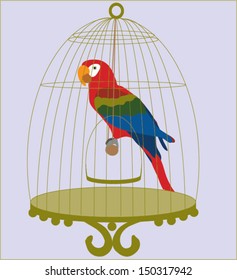The Parrot in cage in Einglish
THE PARROT IN CAGE
Mulk Raj Anand
Mulk Raj Anand (1905-2004),famous Indian novelist, short-story writer, and art critic,was born in peshawar in 1905.He was
educated at the universities of Lahore, London and Cambridge.He lived in England for many years and finally settled in a village
in Westren India.As a writer,his main concern has always been "the creatures in the lower depths of Indian society:the rejected,
who had no way to articulate their anguish the oppressers. His first novel,Untouchable,published in 1935 was an account of the
day-to-day life of an "untouchable."His second novel"Coolie"was the story of a 15-year-old boy,working as a child labourer.
Some of his famous novels are The Village (1939),Across the Black Waters (1940),The Sword and the Sickle (1942),and The Private
Life of an idian Prince(1953).In addition to his novels, Anand also wrote many short stories.The most important influence upon
Anand was Gandhi,who shaped his social conscience. Mulk Raj Anand founded the art magazine Marge and became a director of kutub
Publishers.Her taught at various Indian universities and was appointed as the chairman of the Lalit Kala Akademi from 1965 to
1970.He passed away on September 28,2004. Mulk Raj Anand is remembered for his realistic and sympathetic portrayal of the poor
of the country.His Untouchable poineered what is now called Dalit Literature in English.Anand is regarded,with Raja Rao and
R.K.Narayan,as one of the "founding fathers" of the Indian English novel.
Mulk Raj Anand's short story "The Parrot in the Cage"has the partition of Indian in 1947 as its central theme. The theme is
illustrated through the an old helpless woman who had to leave Lahore and walk all the way to Amritsar on foot. Carrying her pet
parrot in the cage, she hopes to get aid from the Deputy Commissioner at Amritsar.But no aid comes from the government. It is
a gram-stall keeper, who gives a few grams free of cost to her parrot. The tittle"The Parrot in the Cage" is also symbolic because
the country's Partition in 1947 made millions of people leave their homes helplessly.Their condition, fate was settled by
politicians, was no better than that of the parrot that"Rukmani, the protagonist of the story, carries with her.The words
"Ni tun ki karni hain"(What are you doing? and ni tun kithe hai?"(where are you?" are an existential on her plight as a starving,
homeless uprooted old woman who does not know what to do and where to go.
Rukmani is an old woman who has come on foot to Amritsar afetr covering distance of more than sixty kilometers from Lahore, which
was her native place before the Partition. Being a Hindu, she was forced by the rioters to leave Lahore and come to india at
the time of partition. She carry nothing with her pet parrot in the cage. When the story begins, she has already reached Amritsar
and is sitting on the roadside on the roadside, close to the district courts. Her Commissioner of Amritsar.
The Parrot, as it habitual with parrots, has crammed a few short sentences that he used to hear at Lahore. One was a call from
some close female friend Rukmani, who would come looking for her and say, "Rukmani ni Rukmani, tun kithe hai? (Rukmani, O Rukmani,
where are you?) and the other "tu ki karni hain?" (What are you donig?"). As Rukmani is sitting along the road, watching the traffic
and waiting for the Deputy Commissioner careless about the parrots repeated cries.
The parrot goes on repeating the same words in a shriller tone, so that Rukmani has finally to respond and say "Han, my son, haan...
"She has a dull headache behind the knot of hair on the back of her head. As it is the month of September, the heat of the sun in
increasing. Drops of perspiration are trickling through the wrinkles on her old face. She is sitting lost in her thoughts. Files
come close to her toothless mouth and has to strain her eyes to look in the distance.
The parrot again repeats the words " ni tun kithe hai?" This time Rukmani answers him, "I don't know where i am."Hungry as she is,
her mind wavers between the present and the past, when one of her friends, Fato, had come to her that she wopuld be murdered
if she did not leave Lahore. When the parrot repeats the question as to where she is, Rukmani replies as if to herself, that
she is waiting for the Sahib so that he can give her some money to buy bread with. She has also heard that the Congress Government
will..give back what she has lost.
When she says so, the gram-stall keeper, who hears her words, tells her to go to durbar Sahib in the town and get some free food
there. He is quit sceptical about and aid coming from the Deputy Commissioner. But Rukmani persists and curses the stall-keeper
for saying negtive things. Meanwhile, she asks God why she had to leave her home in her old ag and wander like this . She also
blames herslef for not tying the

Amazing
ReplyDeleteWonderful ❤
ReplyDeleteVery good
ReplyDelete